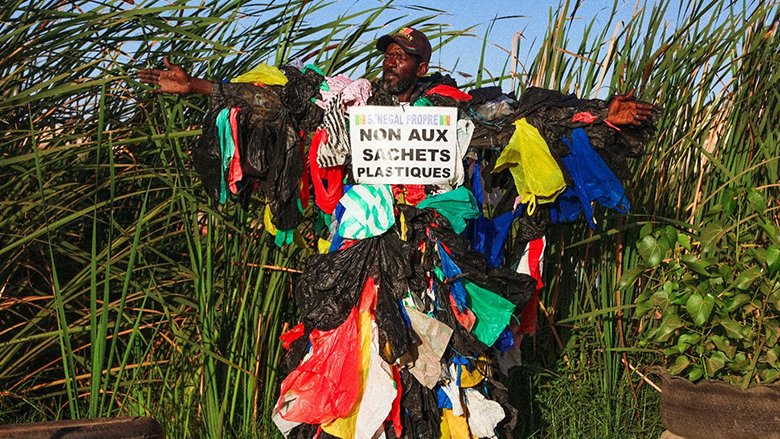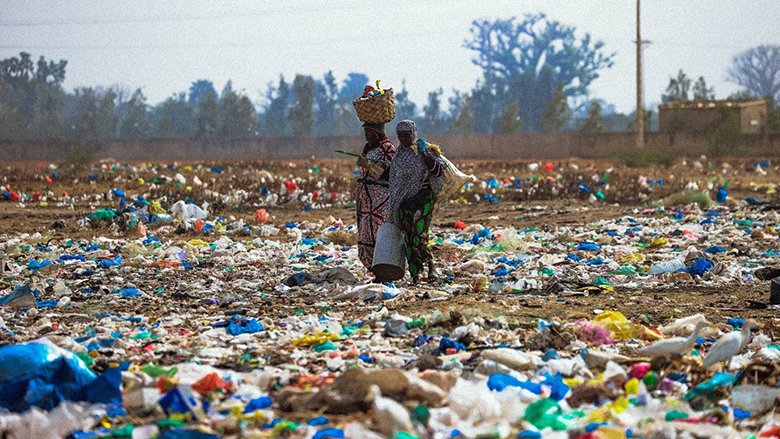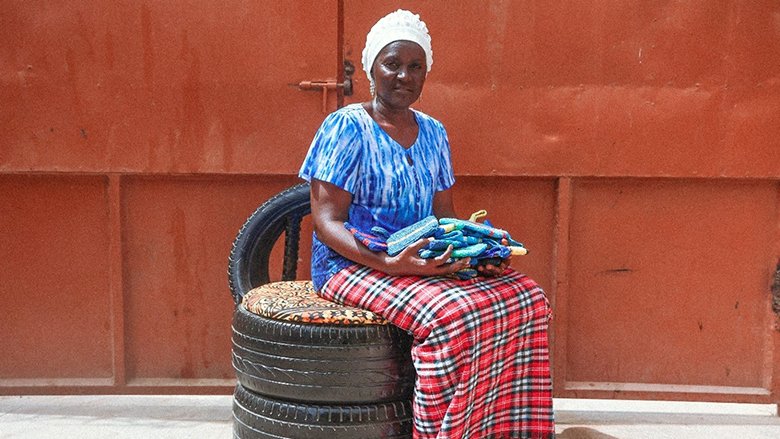Joal, a village on the Senegalese coastline, exemplifies the issue. Located on an island of seashells, Joal is surrounded by a tidal wave of plastic. Thousands of discarded plastic bags litter the beach, cling to the mangrove branches that serve as nurseries for crabs and fish, entangle hatchling turtles and prevent them from making their way from the nest to the water and keep tourists out.
About 80% of plastic waste is mismanaged in coastal West Africa, posing escalating challenges to people, the economy, and the coastal and marine environment.
This issue directly affects farmers’ life. In Kaolack, Senegal, Ndiouck Mbaye, President of the Senegalese Rural Women’s Association expresses her concern: “Our land and cattle are our only wealth. When plastic is burnt in our fields, no plant can grow, and no seed can germinate. Our cows, goats, and sheep consume the plastic that is everywhere in the landscape and are killed.”
Involve businesses and create new wealth
Most of the plastic pollution stems from packaging, and primarily from single-use plastic for food and water consumption and sanitary purposes. A successful reform depends on the support to communities and companies aware of their responsibilities.
The Kirène Group producing 700,000 liters of beverage per day, is orienting 88 % of its production toward large format water bottles of 1.5 or 10 liters to reduce the use of small plastic bags or bottles at the core of the problem: now essential in West Africa, they allow to the most vulnerable to have access to clean, inexpensive drinking water. In 2014, in Ghana with the use plastic water containers, the predicted child mortality rate fell by 42 % . Kirène is now expanding its recycling activities with partners such as Recuplast.
“Our Recuplast branch specializes in bottle recovery, eco-management, and promotion of a circular economy. This plastic waste collection network recovers plastic from people for a fee or gives them recycled products such as basins, tables, or chairs. We are even planning to open factories making furniture from recycled plastic instead of cutting down trees and aggravating deforestation”, explains Macoumba Diagne, Managing Director. Today, Recuplast collects 100 to 150 tonnes of plastic waste a month, employs 240 people, and provides a livelihood to 5,400 people working in recovery-related activities.
Committed Officials and Communities
Elected officials are also crucial in this giant battle of the 21st century. For Dudu Jalloh, member of the Kanifing Municipal Council, it is about sensitizing people: “We have laws but enforcing them is challenging. We need an aggressive public awareness program.”
Bad habits die hard, even if some fishermen readily admit that their practices are harmful." When we go out to sea, we take along gasoline, food, tea, and coal wrapped in plastic which we throw into the sea after use," explains Abdou Rahman, a fisherman from Bargny, Senegal. He adds this comment that illustrates the scale of the problem: "Even before entering the sea, the plastic wraps around our boat’s engines making it difficult to work at all and feed our families."
His colleague Macodou Gueye insists: “Another problem is our fishing nets. When nets made of plastic break, we discard them in the sea”. When asked him what he sees most at sea: “Hundreds and hundreds of baby diapers floating everywhere!” he replies.
Proposed solutions
West Africa has few plastic product production sites. Most countries rely on imported virgin plastic resins and plastic products. Investments are needed in plastic waste management with waste collection, plastic sorting for reuse and recycling, and as a last resort, plastic containment in landfills. The current linear model (produce/consume/throw) needs to transition towards a circular economy model along with innovations and adequate regulatory framework. This should be complemented by private investments and dynamic markets for recycled plastics and plastic substitutes.
The World Bank is involved at every stage of the plastic lifecycle to support countries with projects worth over $2.5 billion focusing on plastic pollution management and prevention. It also provides expertise, encourages private investments, and builds the capacity of regional institutions to bring cross-border solutions.




